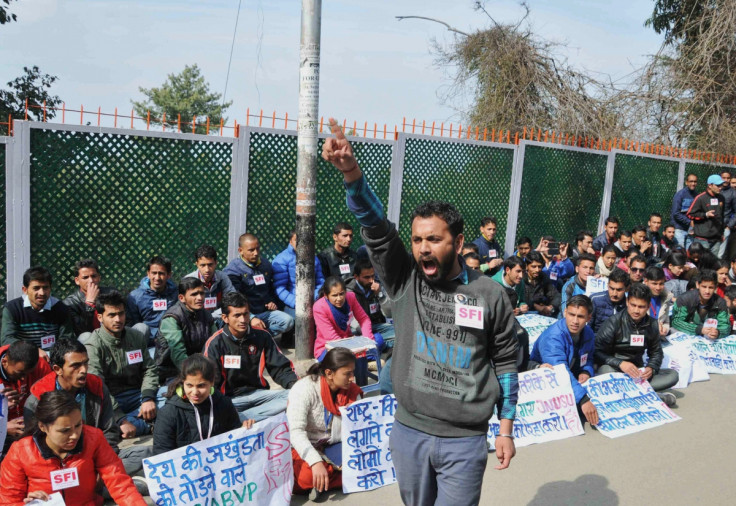We Fund Your Studies: Indians want students to stay away from politics as JNU row continues

India's Jawaharlal Nehru University has been at the centre of a heated debate on "nationalism" versus "freedom of expression" after the student union president was arrested on 12 February. Kanhaiya Kumar was charged with sedition for his role in an event, where students allegedly chanted "anti-India" slogans.
The JNU campus has now turned into a showdown between those fighting for freedom of dissent and freedom of expression, versus those who believe that people expressing anti-India sentiments should be charged with sedition or sent to Pakistan, and prohibited from doing so in the future. On 15 February, the hashtag We Fund Your Studies was trending on Twitter as sections of society warned students to focus on their studies, not politics.
The hashtag started trending after an article was published by Mohandas Pai, chairman of Manipal Global Education, on local broadcaster NDTV's website. The article was titled Dear JNU Students, We Fund Your Studies, Not Your Politics and urged students to restrain from getting involved in politics, with Pai saying that taxpayers should not have to "subsidise extreme views".
Educational institutions were supposed to be cultural and political organisations
Thousands took to Twitter to share his views, with many saying that they did not want their money to go towards "irresponsible" or "anti-nationalist" activities. While other countries attempt to engage more young people in the political sphere, many were tweeting that they want to "get politics out of [university] campus". Others have called on the government to make students pay for their own education if they are to engage in political activities.
However, many were quick to dismiss the calls for students and politics to remain separate. People responded to the trending hashtag by reminding people that education was more than just studying. Jaki Tulang said: "Somebody tell them that education doesn't mean just being bookish. University is a place of critical thinking, not just We Fund Your Studies."
In 2004, 50% of India's population was 30-years-old or younger, giving the country a large youth demographic. In 2007 a World Bank report revealed that 50% of those aged 18-24 described themselves as being "very" or "rather" interested in politics. This prompted the country's general election candidates in 2014 to target a large portion of their campaign's to the youth.
Vimlendu Jha, widely acknowledged as one of India's top 25 youth leaders, wrote on Facebook: "Mr Pai, an educational institution is not a factory where knowledge is transferred from one vessel to another. Historically educational institutions were supposed to be cultural and political organisations. We fund our own education through our own tax that we pay to the government. Stop patronising children and adults of our country."
Anti-Nationalism is serious threat, Govt must create a inspection team what Professors are actually teaching? after all We Fund Your Studies
— Anshul Saxena (@AskAnshul) February 15, 2016
We fund your studies not for becoming irresponsible person but for getting responsible towards India and society.. #ShutdownJNU
— Nitin Patil (@ModiiBhakt) February 15, 2016
We fund your studies. Yes, what comes cheap has no value. Whether it's JNU or FTII, chuck out the troublemakers. Get politics out of campus.
— Ravindra (@ravirao83) February 15, 2016
We fund your studies and you backstab us in return by raising slagans like 'bharat tere tukre honge '
— Bad Programmer (@TejasDilli) February 15, 2016
Shame!#CleanUpJNU
Dear JNU Protesters,
— Rahul Singh (@rahulksingh291) February 15, 2016
We fund your studies, now return our fund with interest.
Taxpayers
Dear Students & Teachers!
— ThunderBird! (@varshasinghs) February 15, 2016
We Fund Your Studies out of our hard earned monies. Please focus on studies not politics.
Regards#DelhiTaxpayers
Dear JNU Students, We Fund Your Studies, Not Your Politics. Well said in the blog. Govt shud revise fee structure https://t.co/oInRar8sAL
— Rajendra Jain (@rkjain2903) February 15, 2016
© Copyright IBTimes 2025. All rights reserved.






















